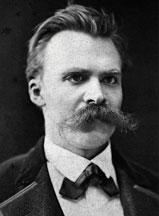Hats off to Nietzsche
 Most of us do not know who we are. Of course, one might say, “I am a
lawyer or an accountant.” Another might say, “I am a social reformer.”
But all these are labels. The professional life of a lawyer, an
accountant or a social reformer is limited by time constraints and that
is only a part of his life. Life is so complex that no one will be able
to define oneself adequately. Most of us do not know who we are. Of course, one might say, “I am a
lawyer or an accountant.” Another might say, “I am a social reformer.”
But all these are labels. The professional life of a lawyer, an
accountant or a social reformer is limited by time constraints and that
is only a part of his life. Life is so complex that no one will be able
to define oneself adequately.
Although we do not know who we are, we yearn to be better than what
we are. However, we are not aware what this means. When we are faced
with such a dilemma, we can turn to philosophers, particularly Friedrich
Nietzsche who was an eminent German philosopher, poet and cultural
critic. Some people do not know how to pronounce his name - Nietzsche.
In fact it rhymes with ‘teach ya’ and then nobody will have a problem in
pronouncing his name.
When you are down and out, a modern-day psychologist will advise you
to count your blessings or pull yourself together. However, Nietzsche
wanted people to get interested in what is going on when they are not
satisfied with themselves. Like Jiddu Krishnamurti, Nietzsche wants us
to understand our own dissatisfaction seriously before doing anything
about it.
External appendages
Most of us think in mundane terms. We want to be successful in life.
We want to earn more money and lead a life of luxury. We want to marry
someone beautiful or wealthy. After some time, we might want to part
with our spouses to build another relationship.
|

Friedrich Nietzsche: If a great thinker despises people,
it is because they are lazy; they seem like broken bits of
crockery, not worth mending. |
Who doesn’t want to call himself a doctor or professor? For
Nietzsche, these are acceptable goals in anybody’s life. But they are
external appendages. Most of them are things we can possess or own. Then
he asks the million dollar question: “Why can’t we become the people we
want to be?”
If you think carefully, each person is a unique creation. You cannot
find two people exactly alike. Nietzsche says that we are too lazy to
admit this fact. We want to satisfy the herd instinct. We do not want to
claim that we are unique and take the credit for it. In his words, this
is nothing but “tendency to sloth.” In one of his essays, Nietzsche
says, “If a great thinker despises people, it is because they are lazy;
they seem like broken bits of crockery, not worth mending.”
We often hear the loud cry from pulpits: “Be yourself!” But these are
empty words. Most people do not want to be themselves. Each person wants
to be somebody else. In reality, after a long and rigorous study and
training, a person becomes a doctor. After some time, he desires to be a
lawyer. Similarly, there are astronomers who have become authors of
books on Buddhism. A retired professor of mathematics is trying to write
novels. Don’t they listen to their conscience which speaks out: “This is
not you”?
Conscience
We are unable to pay heed to our conscience because of the social
conditioning. From our childhood, we have been conditioned to believe
that only lawyers, doctors, architects, accountants and politicians can
succeed in life and enjoy the fruits of happiness. How many parents want
to see their offspring becoming poets, novelists or teachers? They
forget the fact that the Buddha and Jesus Christ were great teachers.
Because of this attitude, we can never be ourselves. In Nietzsche’s
words, “We are bound by the chains of opinion and fear.”
Friedrich Nietzsche’s (1844 - 1900) life offers some memorable
lessons. He was born into a deeply religious family, but when he turned
20, he began to question the religious truths. Nietzsche was such a
brilliant student that in his mid-twenties, he was appointed Professor
of Classics at the University of Basle. He said there was no adequate
evidence for the existence of God. Although he was living alone most of
the time and suffered from various ailments, Nietzsche became a founding
figure of modern philosophy.
Nietzsche cared for the values of life. He urged people to do what
they loved passionately. He also wanted others to brush aside unwanted
ideas and concentrate on what they believe in. In practice, as we know,
some people cry for global peace while fighting with their neighbours.
He did not approve of such conduct and said that values should be lived
out, shaping our existence. Nietzsche’s lessons on life still remain
fresh and valid even after a century of his death. |

